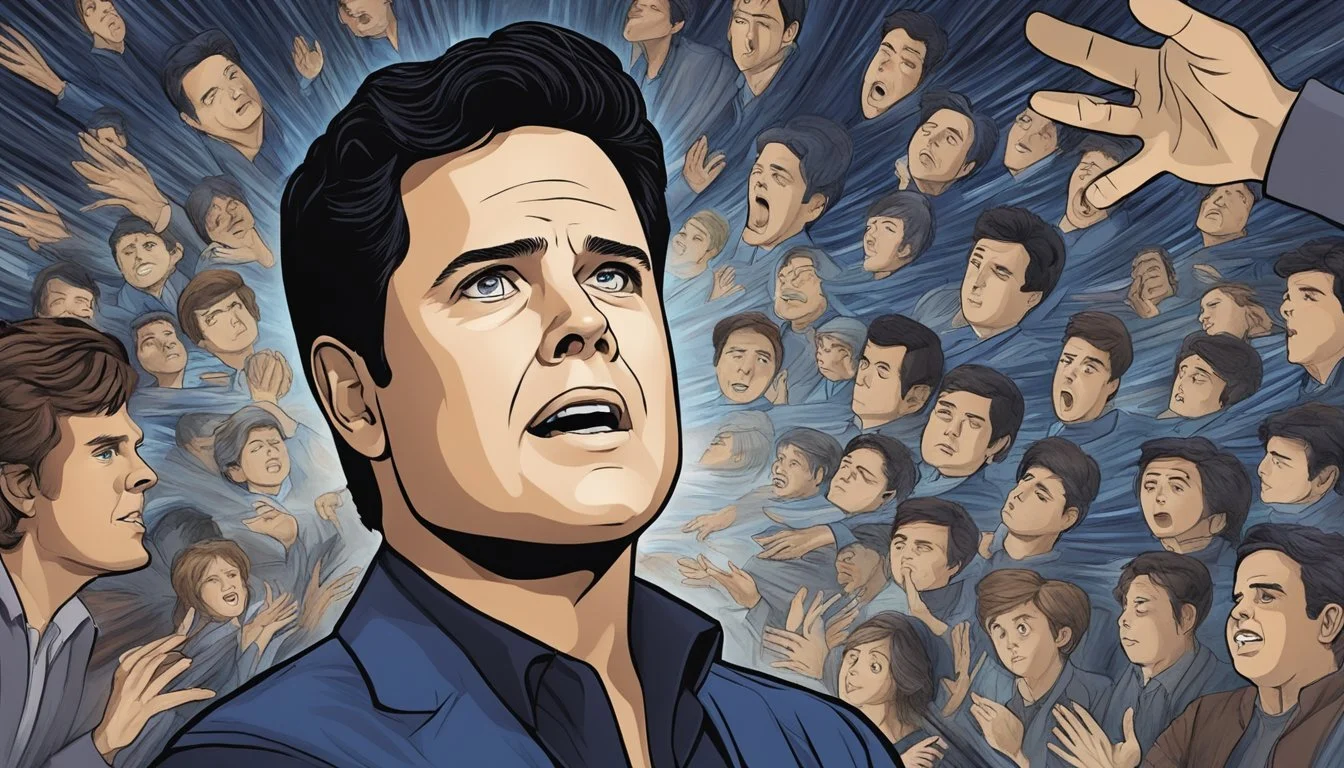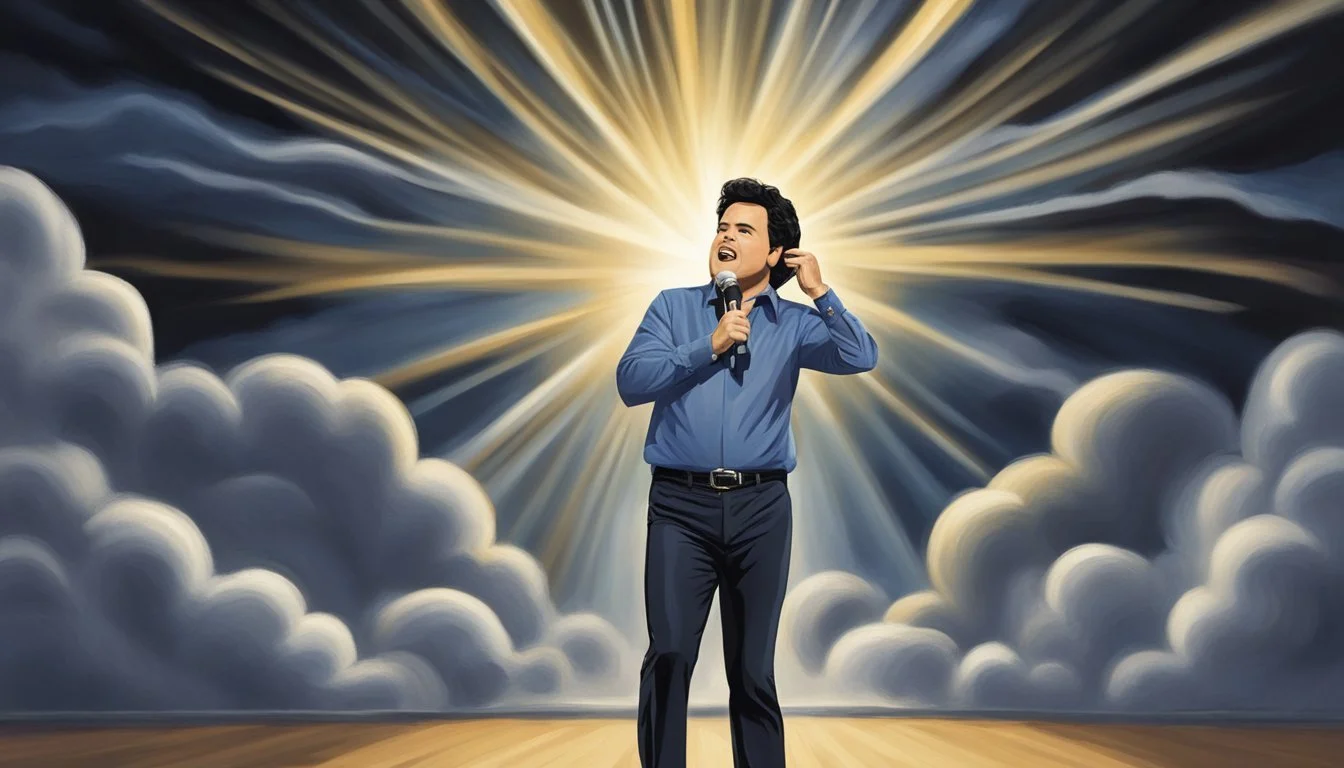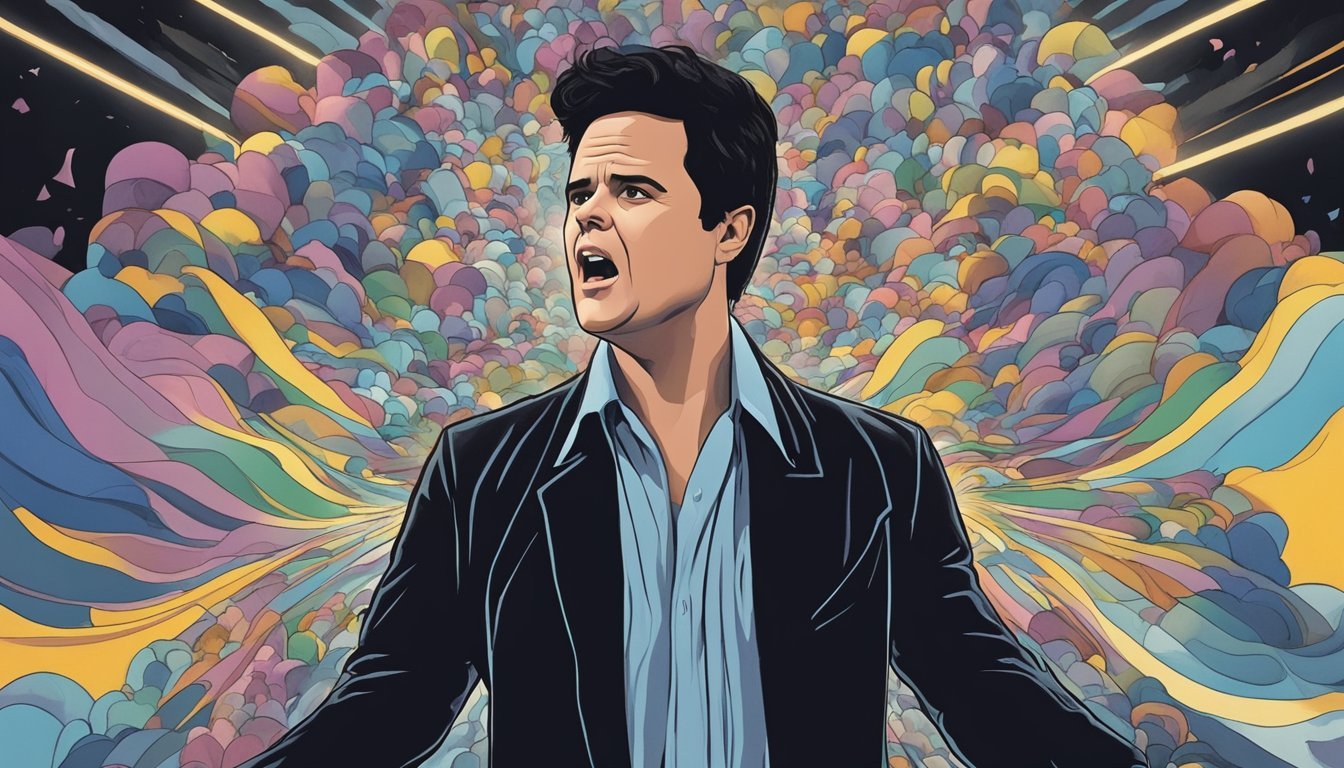Pop Icon's Panic: Donny Osmond's Battle with Clinical Depression and Social Phobia Revealed in New Memoir
Donny Osmond, the beloved pop icon known for his dazzling smile and charismatic performances, has faced a hidden struggle behind the scenes. For years, he battled clinical depression and social anxiety disorder, conditions that threatened to derail his career and personal life.
Despite his outward success, Osmond grappled with debilitating panic attacks and intense anxiety that often left him shaking uncontrollably. The pressure of maintaining his public image while dealing with these internal demons took a significant toll on his mental health. In 1996, Osmond was finally diagnosed with social anxiety disorder, providing a name to the challenges he had been facing.
Recognizing the importance of mental health awareness, Osmond has chosen to share his experiences openly. He hopes that by discussing his journey, he can help others who may be facing similar struggles. Osmond's story serves as a powerful reminder that even those who appear to have it all can still face profound mental health challenges.
Donny Osmond: A Brief Biography
Donny Osmond's journey from child star to enduring entertainment icon spans over six decades. His career showcases remarkable versatility as a singer, actor, and television personality.
Rise to Stardom
Born on December 9, 1957, in Ogden, Utah, Donny Osmond began his career at the tender age of 5. He gained initial recognition as part of The Osmond Brothers, a singing group formed with his siblings. Their talent caught the eye of Andy Williams, leading to regular appearances on his show.
The 1960s saw The Osmond Brothers' popularity soar. Donny's charm and vocal abilities made him a standout, propelling him to teen idol status in the 1970s. His solo career took off with hits like "Puppy Love" and "Go Away Little Girl."
Achievements and Career Highlights
Osmond's career evolved beyond music. He co-hosted the popular "Donny & Marie" variety show with his sister from 1976 to 1979. The show's success cemented his status as a television personality.
In later years, Osmond demonstrated his range by winning "Dancing with the Stars" in 2009. He also found success on Broadway, starring in productions like "Joseph and the Amazing Technicolor Dreamcoat." Osmond's Las Vegas residency with Marie, which ran from 2008 to 2019, became one of the strip's longest-running shows.
Throughout his career, Osmond has sold over 100 million records worldwide. His enduring popularity and ability to reinvent himself have kept him relevant in the entertainment industry for decades.
Understanding Clinical Depression
Clinical depression is a serious mood disorder that affects millions of people worldwide. It goes beyond normal feelings of sadness and can severely impact daily functioning.
Symptoms and Diagnosis
Clinical depression manifests through persistent feelings of sadness, hopelessness, and loss of interest in activities. Common symptoms include changes in sleep patterns, appetite fluctuations, and difficulty concentrating.
Diagnosis requires the presence of these symptoms for at least two weeks. Physical health can both influence and be affected by depression, creating a complex interplay between mind and body.
Healthcare professionals use standardized criteria to assess the severity and duration of symptoms. They also consider the impact on a person's social and occupational functioning when making a diagnosis.
Depression in Public Figures
Public figures, including celebrities, are not immune to clinical depression. Despite outward success, many struggle with internal battles hidden from public view.
Donny Osmond, known for his cheerful stage presence, has openly discussed his experiences with anxiety and depression. His candor highlights the disconnect between public perception and private struggles.
Kim Basinger participated in a documentary about coping with anxiety disorders, bringing attention to mental health issues in Hollywood. These revelations by celebrities help reduce stigma and encourage others to seek help.
Public figures discussing their mental health challenges can inspire fans and the general public to address their own mental well-being.
Exploring Social Phobia
Social phobia, also known as social anxiety disorder, can severely impact a person's life. It involves intense fear of social situations and can manifest in various ways, affecting both personal and professional relationships.
Causes and Triggers
Genetic factors play a role in social phobia development. Individuals with family members who have anxiety disorders are more likely to experience social anxiety themselves. Environmental influences also contribute, such as overprotective parenting or traumatic social experiences.
Common triggers include public speaking, meeting new people, and being the center of attention. For some, everyday activities like eating in public or using public restrooms can provoke anxiety. Negative self-perception and fear of judgment often fuel these fears.
Physical symptoms may include rapid heartbeat, sweating, and trembling. These visible signs can exacerbate anxiety, creating a cycle of increased stress in social situations.
Social Phobia and Performance
Performance anxiety is a specific form of social phobia that affects many individuals, including public figures and performers. It can manifest as stage fright or fear of making mistakes in front of others.
For entertainers like Donny Osmond, this type of anxiety can be particularly challenging. Despite years of experience, the pressure to perform flawlessly can trigger intense anxiety symptoms. This may include difficulty concentrating, memory lapses, and physical discomfort.
Treatment options for performance-related social phobia include cognitive-behavioral therapy and exposure therapy. Some individuals find relief through medication or relaxation techniques. Many performers develop personal coping strategies to manage their anxiety before and during performances.
Donny Osmond's Personal Struggle
Donny Osmond faced significant mental health challenges that impacted his life and career. His journey with anxiety and depression began unexpectedly and had far-reaching consequences.
The Onset of Symptoms
In the early 1980s, Donny Osmond started experiencing severe anxiety symptoms. The once-confident performer found himself struggling with panic attacks and social phobia. These issues peaked during his 1982 Broadway show "Little Johnny Jones," which closed after just one performance.
Osmond's anxiety manifested physically. He would shake uncontrollably and feel overwhelmed in social situations. The pressure of maintaining his public image while battling these internal struggles intensified his condition.
It wasn't until 1996 that Osmond received an official diagnosis of social anxiety disorder. This revelation helped him understand and address his symptoms more effectively.
Impact on Career and Personal Life
Osmond's anxiety and depression significantly affected his professional life. He feared his career was over due to his mental health struggles. The pressure to perform and meet public expectations exacerbated his condition.
His personal life also suffered. Osmond married Debbie in 1978 at age 20, and his mental health issues undoubtedly strained their relationship. The constant battle with anxiety made everyday interactions challenging.
Despite these difficulties, Osmond persevered. He sought treatment and worked to overcome his anxiety. His openness about his struggles has since helped others facing similar challenges.
Osmond's experience highlights the importance of seeking help and diagnosis for mental health issues. His journey demonstrates that even those in the public eye can face significant personal battles.
Seeking Help
Donny Osmond's journey to recovery involved professional intervention and developing coping strategies. His experience highlights the importance of reaching out for support and exploring various treatment options.
Intervention and Support Systems
Osmond's family played a crucial role in encouraging him to seek help. His wife Debbie and siblings provided emotional support during his darkest moments. They recognized the severity of his condition and urged him to consult mental health professionals.
Osmond's management team also intervened, recognizing the impact his mental health was having on his career. They connected him with therapists specializing in anxiety disorders and depression.
The singer found solace in support groups, where he met others facing similar challenges. These connections helped reduce feelings of isolation and provided a safe space to share experiences.
Treatment and Coping Strategies
Osmond underwent cognitive-behavioral therapy (CBT) to address his anxiety and depression. This approach helped him identify negative thought patterns and develop healthier coping mechanisms.
Medication played a role in his treatment plan. Under medical supervision, he tried various antidepressants and anti-anxiety medications to find the right balance.
The singer incorporated mindfulness and relaxation techniques into his daily routine. These included:
Deep breathing exercises
Meditation
Progressive muscle relaxation
Regular exercise became a key part of Osmond's recovery. He found that physical activity helped reduce stress and improve his mood.
Osmond also made lifestyle changes, prioritizing sleep and maintaining a balanced diet. He learned to set boundaries in his professional life to manage stress levels.
Advocacy and Awareness
Donny Osmond's journey with mental health has evolved into a powerful platform for advocacy and public education. His experiences have shed light on the challenges faced by those with anxiety disorders and depression.
Osmond's Role in Mental Health Advocacy
Donny Osmond has become a vocal advocate for mental health awareness. He regularly shares his personal struggles with anxiety and depression in interviews and on social media platforms. This openness has encouraged others to seek help and discuss their own mental health challenges.
Osmond has partnered with mental health organizations to promote understanding and reduce stigma. He participates in awareness campaigns and fundraising events, leveraging his celebrity status to reach a wide audience.
His advocacy work extends to supporting research initiatives focused on anxiety disorders and depression treatments. Osmond's efforts have helped allocate resources to mental health programs and services.
Influencing Public Perception
Osmond's willingness to discuss his mental health journey has significantly impacted public perception. By sharing his experiences, he has humanized mental health struggles and shown that they can affect anyone, regardless of fame or success.
His candid discussions have helped break down stereotypes surrounding anxiety and depression. Osmond's story demonstrates that mental health conditions are manageable with proper treatment and support.
Media coverage of Osmond's advocacy has increased visibility for mental health issues. This exposure has sparked important conversations about the need for improved mental health services and support systems.
Osmond's influence has encouraged other celebrities to speak out about their own mental health experiences, creating a ripple effect of awareness and acceptance.
Lessons Learned
Donny Osmond's journey through anxiety and depression offers valuable insights for others facing similar challenges. His experiences highlight the importance of seeking help and developing coping strategies.
Empathy and Understanding
Osmond's struggles underscore the need for compassion towards those dealing with mental health issues. His openness about his diagnosis helps reduce stigma. It shows that even successful public figures can face internal battles.
Many people with anxiety and depression feel isolated. Osmond's story reminds them they're not alone. His willingness to share his experiences encourages others to seek support.
The entertainer's journey emphasizes the importance of professional help. Proper diagnosis and treatment were crucial for his recovery.
Resilience and Recovery
Osmond's ability to overcome his anxiety demonstrates the power of perseverance. He developed coping mechanisms to manage his symptoms. These included cognitive behavioral therapy and medication.
His recovery highlights the importance of a support system. Family, friends, and professionals played key roles in his healing process.
Osmond's return to performing showcases the possibility of reclaiming one's life. He learned to balance his career with self-care practices. This approach helped him maintain his mental health while pursuing his passion.
His story serves as an inspiration for others battling mental health issues. It proves that with proper treatment and determination, recovery is possible.
Conclusion: Moving Forward
Donny Osmond's journey with clinical depression and social phobia serves as an inspiring example of resilience. Through professional help and personal determination, he has managed to regain control of his life and career.
Osmond continues to perform and entertain audiences worldwide. His openness about his struggles has helped reduce stigma surrounding mental health issues in the entertainment industry.
The singer's experience highlights the importance of seeking support when facing mental health challenges. It also demonstrates that with proper treatment, individuals can overcome even severe anxiety and depression.
Osmond's story encourages others to prioritize their mental well-being. He advocates for self-care and maintaining a balanced lifestyle to manage ongoing symptoms.
By sharing his experiences, Osmond has become a role model for those facing similar challenges. His journey shows that mental health difficulties do not define a person or limit their potential for success.





